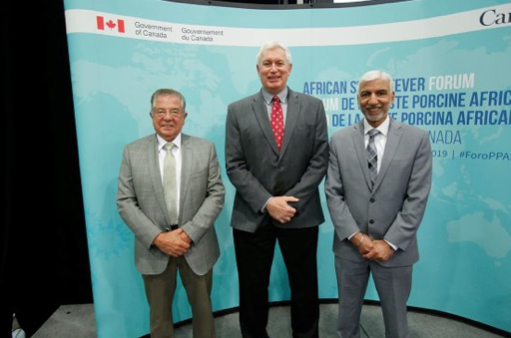| 行業(yè)資訊 | 當前位置:首頁(yè) > 新聞資訊 > 行業(yè)資訊 |
Continent-wide prevention plans are being honed through a newly-formed ‘Americas’ ASF working group, and some trade continuity plans are being put in place in case a breach occurs.
通過(guò)一個(gè)新成立的“美洲”非瘟(ASF)工作組,整個(gè)美洲大陸正在推行預防計劃,并實(shí)施一些貿易連續性計劃,以防疫情爆發(fā)。
Aspects of the management and entry prevention of African Swine Fever (ASF) are being tightened around the world, including new plans for more uniform entry prevention (and control if detection should occur) for the Americas.
世界各地正在加強非洲豬瘟的管理和入境預防工作,包括為美洲制定更加統一的入境預防新計劃(一旦發(fā)現,加以控制)。
Entry prevention actions already taken in ASF-free countries are focussing on preventing meat from being brought in by way of individual airline travellers. For example, in Canada, awareness signs have been posted at airports and social media campaigns have been launched. Officials have applied fines when and where illicit meat has been seized, and the federal government has committed to an expansion of airport ‘sniffer dog’ detection teams.
非瘟疫情安全的國家采取的入境預防行動(dòng)的重點(diǎn)是防止個(gè)人航空旅客攜帶肉類(lèi)入境。例如,在加拿大,機場(chǎng)張貼了提高意識的標志,并發(fā)起了社交媒體宣傳活動(dòng)。官員們已經(jīng)對查獲非法肉類(lèi)實(shí)施了罰款,聯(lián)邦政府也承諾擴大機場(chǎng)“嗅探犬”偵查隊的規模。

Chief veterinary officers lined up at the ASF Forum held in Ottawa, with (left to right) Dr Juan Gay Gutierrez (Mexico), Dr Jack Shere (USA) and Dr Jaspinder Komal, Food Inspection Agency, Canada). Photo: Treena Hein
出席渥太華ASF論壇的首席獸醫官員,左起墨西哥Juan Gay Gutierrez博士、美國Jack Shere博士和加拿大食品檢驗署Jaspinder Komal博士。照片:Treena Hein
Discussing ASF at meetings across the globe
在全球會(huì )議上討論非瘟
Recently, ASF was discussed at the G20 agriculture ministers meeting in Japan. In addition, more than 150 officials met in Ottawa for a global ASF forum, co-chaired by Canada and the USA.
最近,在日本舉行的20國集團農業(yè)部長(cháng)會(huì )議上對非洲豬瘟作了討論。此外,150多名官員在渥太華會(huì )晤,參加由加拿大和美國共同主持的全球非瘟論壇。
Delegates attended from China, Mexico, UK, France, Australia, Denmark, New Zealand, Barbados, Dominican Republic, Bolivia, Czech Republic, Japan and Brazil. The United Nations Food and Agriculture Organization (FAO) and the World Animal Health Organization (OIE) also sent representatives.
來(lái)自中國、墨西哥、英國、法國、澳大利亞、丹麥、新西蘭、巴巴多斯、多米尼加共和國、玻利維亞、捷克共和國、日本和巴西的代表出席了會(huì )議。聯(lián)合國糧農組織(FAO)和世界動(dòng)物衛生組織(OIE)也派了代表。
ASF plan with 16 focus areas
非瘟防治計劃包含16個(gè)重點(diǎn)領(lǐng)域
Attendees agreed to a plan with 16 areas of focus. “Jointly, we have developed a framework that will support ongoing international collaboration and action in the areas of preparedness planning, enhanced biosecurity, business continuity and coordinated risk communications,” explained Dr Jaspinder Komal, Canada’s chief veterinary officer (CVO), the OIE delegate for Canada and vice president of the science branch at the Canadian Food Inspection Agency (CFIA).
與會(huì )者就一項包括16個(gè)重點(diǎn)領(lǐng)域的計劃達成一致。加拿大首席獸醫官(CVO)、世界動(dòng)物衛生組織加拿大代表和加拿大食品檢驗署(CFIA)科學(xué)分會(huì )副會(huì )長(cháng) Jaspinder Komal博士解釋說(shuō),“我們共同開(kāi)發(fā)了一個(gè)框架,將有助于進(jìn)行中的國際合作和行動(dòng)領(lǐng)域的應急預案、加強生物安全、業(yè)務(wù)連續性和協(xié)調的風(fēng)險溝通”。
In addition, if ASF is found in Canada, spread of the disease will be prevented through new criteria added to export certificates for live animals, germplasm, animal products and by-products between Canada and the USA and Canada and Europe. This criteria will allow safe trade to continue from disease-free zones.
此外,如果在加拿大發(fā)現ASF,將通過(guò)在加拿大與美國、加拿大與歐洲之間的活動(dòng)物、種質(zhì)、動(dòng)物產(chǎn)品和副產(chǎn)品出口證書(shū)上增加新標準來(lái)防止該病的傳播。這一標準將使無(wú)疾病區的貿易得以安全繼續。
Approved disease-free zones
經(jīng)批準的無(wú)病區
If the disease is found in Canada or the USA, Komal (in collaboration with the US CVO, Dr Jack Shere) officially stated on May 22 that safe trade will continue in approved disease-free zones, zones that will be created using parameters first arranged in August 2018 and will be defined at the time of an outbreak according to OIE guidelines.
如果在加拿大或美國發(fā)現非瘟,Komal博士(與美國首席價(jià)值官Jack Shere博士一起)于5月22日正式聲明,安全貿易將繼續在經(jīng)批準的無(wú)病區域進(jìn)行。這些區域將通過(guò)2018年8月首次設定的參數以及世界動(dòng)物衛生組織(OIE)的指導方針劃定。
In addition, a new ASF working group for North and South America (‘the Americas’) is currently forming, similar to groups already in place among Asian nations and European nations to address ASF issues. These groups all fall under the the Global Framework for the Progressive Control of Transboundary Animal Diseases (GF-TADs), a joint initiative between FAO and OIE.
此外,目前正在成立一個(gè)新的北美洲和南美洲(即“美洲”)非瘟F工作組,類(lèi)似于亞洲國家和歐洲國家已經(jīng)成立的處理非瘟的工作組。這些群體都屬于糧農組織和世界動(dòng)物衛生組織共同發(fā)起的《逐步控制跨境動(dòng)物疾病的全球機制》(GF-TADs)。
Sharing strategies and tools to prevent ASF spread
共享防止非瘟傳播的策略和工具
CFIA director of animal import & export Dr Mohit Baxi said that once the initiative gets up and running over the next few months, meetings will be held to share strategies and tools to prevent introduction of ASF in the Americas and develop control plans to prevent further spread of the disease if it appears in countries within these continents.
CFIA動(dòng)物進(jìn)出口主任Mohit Baxi博士說(shuō),一旦該機制開(kāi)始啟動(dòng),接下來(lái)幾個(gè)月里,美洲將舉辦會(huì )議,分享防止非瘟進(jìn)入美洲的策略和工具,并制定控制計劃,一旦美洲大陸上有國家暴發(fā)疫情,防止疾病進(jìn)一步傳播。
He said, “All 31 countries in North and South America are included in this working group. We will discuss risk communication strategies, surveillance plans and biosecurity protocols so that the appropriate leaders in all countries can all make the right decisions at the right time, and so that countries without a lot of infrastructure can be empowered as much as possible.”
他說(shuō):“北美和南美的所有31個(gè)國家都在這個(gè)工作組中。我們將討論風(fēng)險溝通戰略、監測計劃和生物安全協(xié)議,以便所有國家的適當領(lǐng)導人都能在正確的時(shí)間做出正確的決定,讓缺乏大量基礎設施的國家能夠獲得盡可能多的幫助。”
Dr Baxi said, “ASF is moving worldwide. We need to be on top of prevention and control, and also handle food security issues that may arise.”
Baxi博士說(shuō):“非瘟正在全球范圍內傳播。我們需要在預防和控制方面處于領(lǐng)先地位,并解決可能出現的糧食安全問(wèn)題。”





